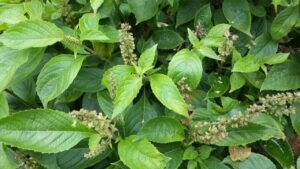Uziza (Piper guineense) is a West African spice that is full of flavors and medicinal benefits.
The plant is a perennial climber and grows up to 10 meters or more in height.
The leaves of Piper guineense give a peppery flavor to soups while the dried fruits and seeds give African dishes an aromatic and spicy flavor.
In African communities, it is commonly used by postpartum women to help shrink the uterus back to its original size.
Other names for this spicy plant include West African pepper, Ashanti pepper, Uziza, Iyere, Guinea pepper, kale, Benin pepper, false cubeb, Guinea cubeb, and Sorowisa.
Nutritional facts of uziza seeds and leaves
Just like most peppers, piperine is the active constituent that is responsible for most of uziza’s numerous medicinal benefits and pungent aroma.
The seeds and leaves are rich in essential nutrients like carbohydrates, lipids, protein, calcium, magnesium, potassium, iron, sodium, and iron.
Potential health benefits
Uziza’s rich content of antioxidants like piperine and other phytochemicals (flavonoids) is responsible for its many health benefits. The health benefits of this amazing plant include:
1. Relieves cold and cough
Uziza has been in use in ancient African medicine to treat cold and cough symptoms. Piperine, the essential oil in uziza helps to relieve congestion and clear out thick mucus.
Furthermore, uziza is rich in essential nutrients that help strengthen immunity and protect your body from infectious diseases.
To prepare a drink that relieves cold symptoms; simply mix one tablespoon of dried grounded uziza fruits with two tablespoons of honey in a cup of hot water. Allow to rest and drink three times daily until symptoms clear completely.
Related: 20 Fast Natural Remedies for cold and cough
2. Fights infection

The fruits and leaves of uziza have long been in use to treat microbial infections in African traditional medicine.
Traditional healers use the fresh leaves or dried fruits to make an alcohol infusion that is given to treat bacterial, fungal, and parasitic infections.
One study found that the fruit and leaf extract of uziza (P. guineense) showed antimicrobial and antifungal activity against several human pathogens.
Another animal study found that extracts of P. guineense cleared about 60% of malaria-causing parasites from the blood.
3. Prevents cancer
Piperine, the active ingredient in P. guineense has been found to inhibit the proliferation and growth of cancer cells in several studies.
One study found that piperine present in uziza and other peppers (black pepper) may prevent and treat breast cancer. However, more human research is needed.
4. Improves digestion
The leaves of uziza (Piper guineense) add fiber to your diet, stimulates bowel movement, and reduces constipation.
Uziza also has carminative properties that help to reduce flatulence and stomach gas.
Related: 15 top African foods rich in Dietary Fiber
5. Controls blood sugar level
A high blood sugar level is a common symptom of diabetes.
One scientific study found a smaller spike in blood glucose levels in rats fed with glucose when compared with the control group.
Also, traditional medicine experts believe that eating uziza soup regularly could help treat high blood sugar levels in people with diabetes.
6. Has anti-inflammatory properties
Inflammation is often an underlying factor in most health conditions like diabetes, arthritis, heart disease, and cancer.
One 2018 study found that hexane extracts of P. guineense showed potent anti-inflammatory properties in animal models.
Meanwhile, in traditional medicine, a poultice prepared from dried fruits of uziza is applied externally to reduce arthritic pain.
7. Promotes weight loss
Adding uziza to your diet may help boost your metabolism and promote weight loss.
Also, drinking uziza tea before meals promote satiety, and reduces overeating.
Related: 50 best African foods to lose weight fast
8. Treats male and female infertility
In African medicine, dried uziza fruit is used as an aphrodisiac in males and females. It relaxes the nerves and improves blood circulation.
While the leaves are used to treat fibroids and correct infertility in women.
Related: 20 best African foods to treat infertility
9. Enhances brain health
Piper guineense has been in use in African traditional medicine to treat convulsion and epileptic seizures.
Scientific research also confirmed this.
The study found that water extracts of P. guineense showed prolonged anticonvulsant activity against animal seizure in safe doses.
10. Promotes uterine contraction after childbirth
Uziza (Piper guineense) is added to soups and given to women after childbirth.
It is believed to reduce or shrink the uterus, cleanse the uterus, and promote milk supply.
Culinary uses

Uziza has become a kitchen staple in most parts of Africa.
It’s highly versatile and adds a subtle but bold flavor to any dish.
- Soups: You can prepare “uziza soup” by adding fresh or dried uziza leaves and fruits to beef stock. Garnish with palm oil, fish, seasonings, and vegetables. It gives you a delicious savory soup that can be eaten with rice or mash.
- Tea: You can prepare uziza tea for cold and cough. Simply place 2 or 3 leaves of fresh uziza leaves into a cup of hot water. Allow seeping for some minutes before drinking. You can sweeten with honey to your taste.
- Garnish: A dash of dried ground uziza fruit can be a tasty seasoning for beef, poultry, fish, vegetables, stew, rice, and yam.
Safety during pregnancy
Eating uziza leaves in soups is completely safe during pregnancy.
However, you may want to avoid consuming large doses of uziza fruits or seeds if you are pregnant.
Always strive to eat normal quantities of every food during pregnancy – including uziza because too much of any food may cause unwanted side effects.
The bottom line
Uziza (Piper guineense) and its active compound – piperine – may have potent antimicrobial, anti-cancer, anti-inflammatory, anticonvulsant, and anti-diabetic activity.
Laboratory studies suggest that the plant parts are incredibly loaded with antioxidants and compounds that elicit these benefits.
However, more human studies are required to better understand the exact health benefits of uziza and the precise doses needed to treat health conditions.
Nonetheless, this superb flavor enhancer is worth adding to your daily cooking as its savory flavor is a great addition to any dish.
Mgbeahuruike E. 2019. Evaluation of the Medicinal Uses and Antimicrobial Activity of Piper guineense Schumach &Thonn. Research gate DOI https://www.researchgate.net/publication/333673716
Do, Minh Truong et al. “Antitumor efficacy of piperine in the treatment of human HER2-overexpressing breast cancer cells.” Food chemistry vol. 141,3 (2013): 2591-9. doi:10.1016/j.foodchem.2013.04.125
Rather, Rafiq A, and Madhulika Bhagat. “Cancer Chemoprevention and Piperine: Molecular Mechanisms and Therapeutic Opportunities.” Frontiers in cell and developmental biology vol. 6 10. 15 Feb. 2018, doi:10.3389/fell.2018.00010
A. Y. Kabiru, et al. “In Vivo Antiplasmodial and Analgesic Effect of Crude Ethanol Extract of Piper guineense Leaf Extract in Albino Mice”, Scientifica, vol. 2016, Article ID 8687313, 6 pages, 2016. https://doi.org/10.1155/2016/8687313
Maeda, Ayumi, et al. “Piperine Promotes Glucose Uptake through ROS-Dependent Activation of the CAMKK/AMPK Signaling Pathway in Skeletal Muscle.” Molecular nutrition & food research vol. 62,11 (2018): e1800086. doi:10.1002/minor.201800086
Anyasor G. et al. 2018. “Evaluation of the Anti-inflammatory Activity of Piper guineense Schumach. & Thonn. Seeds Fractions using In vitro and In vivo Models” Journal of biologically active compounds DOI: 10.1080/22311866.2018.1510790
Abila, B et al. “Anticonvulsant effects of extracts of the West African black pepper, Piper guineense.” Journal of ethnopharmacology vol. 39,2 (1993): 113-7. doi:10.1016/0378-8741(93)90026-2
Get new free and exclusive health tips delivered straight to your inbox!



